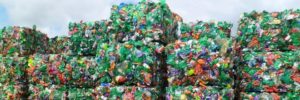Arthur ten Wolde, 28 February 2017
This column was translated from the Dutch version published on Stadszaken.nl
Plastics are everywhere. Around 2011, plastics prompted me to start working on accelerating and mainstreaming the circular economy. How do you prevent different collection schemes in every municipality and how do you prevent the use of plastics in the first place?
Taken together, we all use huge amounts of plastic, of which almost 40% for packaging. Only 15% of the plastics consumption in Europe is collected after use, and an even smaller proportion is actually recycled. The rest is landfilled, incinerated or disappears in nature.
In the Netherlands, with 51% recycling of plastic waste, the performance is actually way above average. Still, one sees a lot of plastic litter, and fulmars in the North Sea have plastic in their stomachs, although those amounts are fortunately decreasing. And while the separate collection of plastics has increased, it is now facing soaring costs for a growing share of plastics that are difficult to recycle.
The waste management organisations therefore want to increase post-separation. Understandable, but please do take care of a clear story to the public. Why perform separate collection in one town and not in another? Why is the collection scheme in Belgium different than in the Netherlands?
A clear story would be, for example: one particular system for each type of district. E.g., separate collection for a specific type of terraced houses, post-separation for high-rise buildings, etc. And apply the same system everywhere – that directly saves costs. Just like 10-30% cost savings on waste collection can be obtained for industrial parks by white collecting: one organisation efficiently collects on behalf of several others, that in turn do no longer must drive around the terrain half empty.
But when will we finally start to reduce the plastic flow? Recycling is the worst circular option (landfill and incineration are not circular). Dutch Sustainable Business association De Groene Zaak has proposed last year to significantly increase the fee on various plastic packaging, in order to stimulate companies to reduce. No response. The discussion is focused one-sidedly on collection and the percentage that is recycled, even though consultancy CE Delft showed in 2001 already that the effects of 4-5 times higher fees (like in Norway at the time) can be very substantial. Still, several Dutch political parties are now advocating to increase the packaging tax as part of their election campaigns.
Altogether, Brussels likes to leave much of the waste policy to the Member States, the Dutch government leaves implementation to the municipalities, many municipalities are unable to make good choices, and the Dutch association of municipalities VNG does what the members want. With all due respect for the professionalism of the Ministry for the Environment, the Waste Fund Packaging, Nedvang and other organisations, I therefore call on all parties concerned to come to a more uniform approach and address the problems, including reducing waste and litter, and clarity to citizens. Because on one thing I wholeheartedly agree with Cees de Mol van Otterloo from the Packaging Waste Fund: we have no choice but to make this a success in 2017.
Arthur ten Wolde works as an expert Circular Economy for Dutch Green Business association De Groene Zaak and is owner of Circular Future
